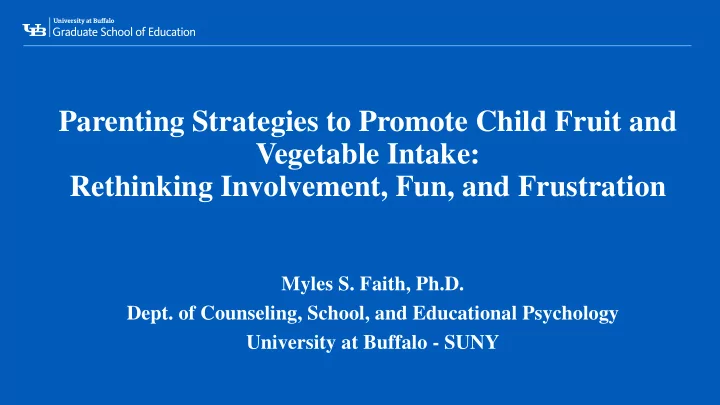

Parenting Strategies to Promote Child Fruit and Vegetable Intake: Rethinking Involvement, Fun, and Frustration Myles S. Faith, Ph.D. Dept. of Counseling, School, and Educational Psychology University at Buffalo - SUNY
Overview • Question: Is parental ‘involvement’ always/necessarily better for promoting a healthier child diet and weight control? • Specific behavior change strategies: More effective (ideally fun, potentially family-strengthening) Less effective (probably frustrating) • Conclusion
Overview • Question: Is parental ‘involvement’ always/necessarily better for promoting a healthier child diet and weight control? • Specific behavior change strategies: More effective (ideally fun, potentially family-strengthening) Less effective (probably frustrating) • Conclusion
Parental Involvement and Childhood Obesity Treatment Response: A Game-Changing Review • Meta-analytic review. • Compare studies with low, medium, or high level of parental participation in childhood obesity treatment. • “High”= Family involved in all aspects of tx. “Medium” = Family is involved, but child is solely responsible for significant aspects of tx. “Low” = Parents have minimal involvement. Haddock et al. (1994). Annals Behavioral Med, 16, 235-244.
Participation Level N Cohen’s d (Standardized mean difference for tx vs. control) High 6 .48 Medium 6 .70 Low 12 .51 “Since providing training to parents may increase the cost of childhood weight loss programs, this finding suggests reducing parental participation to minimum necessary levels”. Haddock et al. (1994). Annals Behavioral Med, 16, 235-244.
Faith et al. (2012). Circulation , 125, 1186-1207
• Parents treated together with (vs. separately from) their obese child or parents (vs. the child) was the focus of treatment. • N= 12 studies, 1975 through 2008. Family-based pediatric obesity tx. • Did interventions with greater parental involvement achieve better improvements in child overweight? • Result: Parental involvement better child outcomes in only 2/12 studies (~17%) after treatment. • Result: Parental involvement better child outcomes in only 3/12 studies (~25%) at follow-up.
Overview • Question: Is parental ‘involvement’ always/necessarily better for promoting a healthier child diet and weight control? • Specific behavior change strategies: More effective (ideally fun, potentially family-strengthening) Less effective (probably frustrating) • Conclusion
Core Behavior Change Strategies Faith et al. (2012). Circulation , 125, 1186-1207
Core Behavior Change Strategies Keep repeated exposure! Covert control (Ogden and colleagues)
Core Behavior Change Strategies Keep on repeated exposure! Keep on writing!
Monitoring Forms: Flexibility and Personalizing
Core Behavior Change Strategies Keep on repeated exposure! Keep it positive! Keep on writing!
‘Broaden and Build Theory’
Overview • Question: Is parental ‘involvement’ always/necessarily better for promoting a healthier child diet and weight control? • Specific behavior change strategies: More effective (ideally fun, potentially family-strengthening) Less effective (probably frustrating) • Conclusion
Controlling Feeding Styles and Child Nutrition/Obesity • Restrictive feeding associated with increased child BMI gain (Faith et al., Pediatrics, 2004, 114: e429-436; Shloim et al., 2015, Frontiers in Psych, 6, 1849) • Pressuring children to eat food is associated with poorer eating regulation and questionably effective for promoting healthy eating (Blissett, Appetite, 2011, 57, 826-831). • Compliant eating among girls is associated with obesity onset over 10 years (Faith et al., 2012, Childhood Obesity, 2013, 9, 427-436). • Restrictive feeding predicts poorer child treatment response to family-based obesity treatment (Holland et al., Obesity 2014, 25, E119-E126)
Feeding Demands Questionnaire: • Parent ‘Anger/Frustration’ correlated with greater parental pressure to eat. • Parent ‘Food Amount Demands’ correlated with greater parental restriction, pressure to eat, and monitoring. • Parent ‘Food Type Demands’ correlated with greater monitoring. Faith et al. (2008). J Am Diet Association, 108, 624-630.
Baranowski et al. (2015). Public Health Nutrition , 18, 1028-1035
Overview • Question: Is parental ‘involvement’ always/necessarily better for promoting a healthier child diet and weight control? • Specific behavior change strategies: More effective (ideally fun, potentially family-strengthening) Less effective (probably frustrating) • Conclusion
Reflections: Looking back and forward • ‘Parental involvement’ may not always/necessarily be helpful for promoting healthier diet and weight control. Vague construct. • More refined, nuanced measures of involvement are need to discriminate more vs. less effective strategies. Need to study how strategies are implemented in different interventions. • Need for more research on parent emotion – negative and positive. Implications for intervention? • Need to study treatment influences on family relationships. Do they foster fun or family frustration/conflict? Implications for sustainability?
Recommend
More recommend